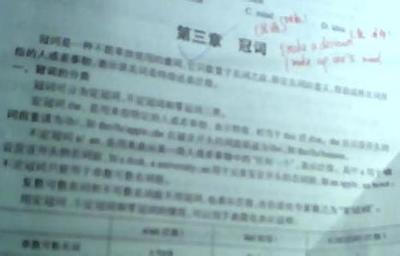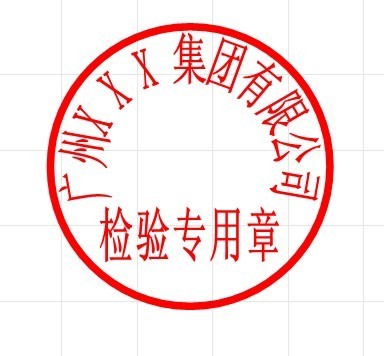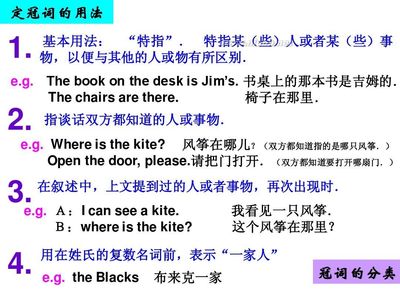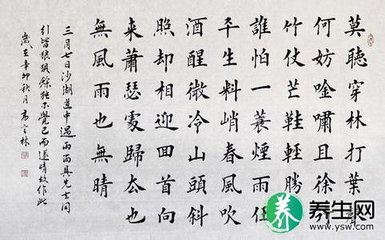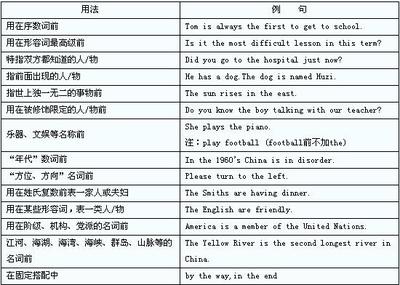冠词(Article)是一种虚词,在句子中不重读,本身不能独立使用,只能放在名词前帮助说明名词所指的人或事物。冠词有两种,一种是不定冠词(Indefinite Article),,一种是定冠词(Definite Article)。定冠词(例如英语中的the)用来限定这个冠词后面的名词是某个特定的事物。
考题点击1 As a rule, domestic servants doing odd jobs are paid _______. (04上海春季)
A. by the hour B. by hour C. by an hour D. by hours
“按小时付费”,以及其它用来表示“按…计算” 都需用介词 by 加 the 加单位名词来表示,如: by the day; by the jin; by the pound; by the dozen …。 但需注意:size; weight; time; length … 等名词并 不表示单位,所以不需加 the。
考题点击2 On May 5, 2005, at ________World Table Tennis D Championship, Kong Linghui and Wang Hao won the gold medal in men's doubles with ________ score of 4: 1. (05江苏卷)
A. a; a B. 不填; the C. a; 不填 D. the; a
“the World Table Tennis Championship”是由普通名词构成的专有名词,用来表示一个机构名称。这类名词前都要加 the。 “with a score of 4:1” 表示 “以4:1的比分”,是一个介词短语结构。
考题点击3 This book tells ________ life story of John Smith, who left ______ school and worked for a newspaper at the age of 16. (05辽宁卷)
A. the; the B.a; the C.the; 不填 D.a; 不填
“这本书讲的是 John Smith 的人生故事”,是特指的,所以必须用the。“leave school”表示“毕业”,不用冠词。类似的用法还有:finish school; in class; at church; go to school …等。
定冠词the与指示代词this,that同源,有“那(这)个” 的意思,但较弱,可以和一个名词连用,来表示某个或 某些特定的人或东西。1)特指双方都明白的人或物:Take the medicine.把药吃了。
2)上文提到过的人或事:He bought a house.I‘ve been to the house. 他买了幢房子。我去过那幢房子。
3)指世上独一物二的事物:the sun,the sky,the moon,the earth
4)与单数名词连用表示一类事物,如:the dollar 美元; the fox 狐狸;或与形容词或分词连用,表示一类 人:the rich 富人; the living 生者。
5)用在序数词和形容词最高级,及形容词only,very,same等前面:Where do you live? I live on the second floor. 你住在哪?我住在二层。 That‘s the very thing I’ve been looking for. 那正是我要找的东西。
6)与复数名词连用,指整个群体:They are the teachers of this school.指全体教师) They are teachers of this school.(指部分教师)
7)表示所有,相当于物主代词,用在表示身体部位 的名词前:She caught me by the arm.. 她抓住了我的手臂。
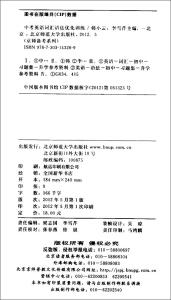
8)用在某些由普通名词构成的国家名称、机关团体、阶级、等专有名词前: the People‘s Republic of China 中华人民共和国 the United States 美国 9)用在表示乐器的名词之前:She plays the piano. 她会弹钢琴。
10) 用在姓氏的复数名词之前,表示一家人: the Greens 格林一家人 (或格林夫妇)
11) 用在表示“度量衡”之类的名词前:Apples are sold by the pound. 但要注意在 time, weight, length 等名词前不加 the。
12) 用在惯用语中:in the day, in the morning (afternoon,evening);the day after tomorrow;tomorrow the day before yesterday;the next morning; in the sky (water,
field,country);in the dark;in the rain; in the distance;in the middle (of);in the end;on the whole;by the way;go to the theatre
 爱华网
爱华网